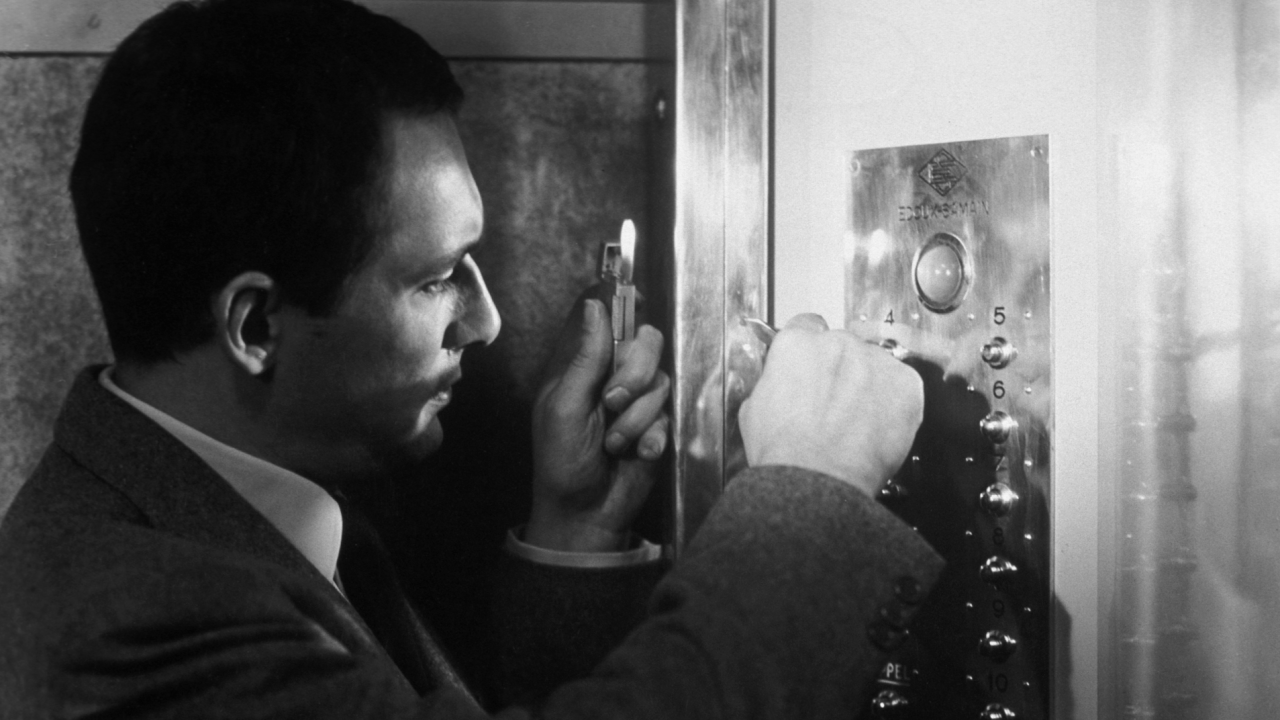Elevator to the Gallows

For his feature debut, twenty-four-year-old Louis Malle brought together a mesmerizing performance by Jeanne Moreau, evocative cinematography by Henri Decaë, and a now legendary jazz score by Miles Davis. Taking place over the course of one restless Paris night, Malle’s richly atmospheric crime thriller stars Moreau and Maurice Ronet as lovers whose plan to murder her husband (his boss) goes awry, setting off a chain of events that seals their fate. A career touchstone for its director and female star, Elevator to the Gallows was an astonishing beginning to Malle’s eclectic body of work, and it established Moreau as one of the most captivating actors ever to grace the screen.
BLU-RAY SPECIAL EDITION FEATURES
- New 2K digital restoration, with uncompressed monaural soundtrack
- Interview from 2005 with actor Jeanne Moreau
- Archival interviews with Moreau, director Louis Malle, actor Maurice Ronet, and original soundtrack session pianist René Urtreger
- Footage of musician Miles Davis and Malle from the soundtrack recording session
- Program from 2005 about the score, featuring jazz trumpeter Jon Faddis and critic Gary Giddins
- Malle’s student film Crazeologie, featuring Charlie Parker’s song “Crazeology”
- Trailers
- PLUS: An essay by critic Terrence Rafferty, an interview with Malle, and a tribute by film producer Vincent Malle
BLU-RAY SPECIAL EDITION FEATURES
- New 2K digital restoration, with uncompressed monaural soundtrack
- Interview from 2005 with actor Jeanne Moreau
- Archival interviews with Moreau, director Louis Malle, actor Maurice Ronet, and original soundtrack session pianist René Urtreger
- Footage of musician Miles Davis and Malle from the soundtrack recording session
- Program from 2005 about the score, featuring jazz trumpeter Jon Faddis and critic Gary Giddins
- Malle’s student film Crazeologie, featuring Charlie Parker’s song “Crazeology”
- Trailers
- PLUS: An essay by critic Terrence Rafferty, an interview with Malle, and a tribute by film producer Vincent Malle

Cast
- Jeanne Moreau
- Florence Carala
- Maurice Ronet
- Julien Tavernier
- Georges Poujouly
- Louis
- Yori Bertin
- Véronique
- Jean Wall
- Simon Carala
- Lino Ventura
- Inspector Chérier
- Iván Petrovich
- Horst Bencker
- Félix Marten
- Christian Subervie
- Elga Andersen
- Frida Bencker
- Gérard Darrieu
- Building porter
- Sylviane Aisenstein
- Secretary
- Charles Denner
- Assistant inspector
- Hubert Deschamps
- Assistant district attorney
- Jean-Claude Brialy
- Chess player at motel
Credits
- Director
- Louis Malle
- Producer
- Jean Thuillier
- Screenplay
- Roger Nimier
- Screenplay
- Louis Malle
- Based on the novel by
- Noël Calef
- Cinematography
- Henri Decaë
- Music
- Miles Davis
- Camera operators
- André Villard
- Camera operators
- Jean Rabier
- Production design
- Rino Mondellini
- Production design
- Jean Mandaroux
- Production manager
- Irénée Leriche
- Editor
- Léonide Azar
- Assistant editors
- Kenout Peltier
- Assistant editors
- Madeleine Bibollet
- Sound
- Raymond Gauguier
- Technical consultant
- Jean-Paul Sassy
- Assistant directors
- Alain Fraissé
- Assistant directors
- François Leterrier
- Script girl
- Francine Corteggiani
- Photographer
- Jean-Louis Castelli
- Makeup
- Boris de Fast
- Production
- Nouvelles Éditions de Films






















